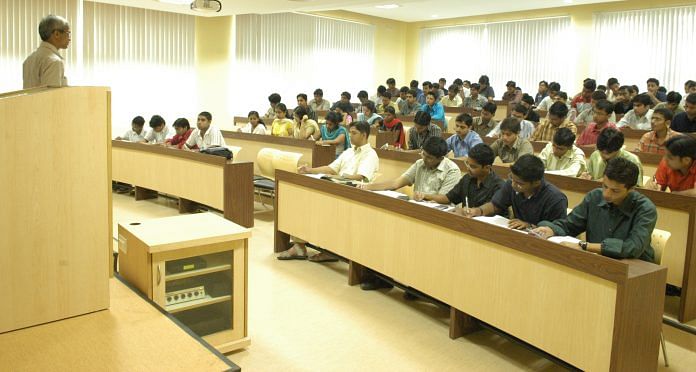Panel recommends evaluating students not on just academics but also ‘high moral character’ and tolerance for diversity.
New Delhi: From incorporating quizzes and rapid-fire tests into the evaluation process to judging students for their emotional and social quotient — rather than just academic knowledge — an expert committee has submitted some drastic recommendations to the government for the revamp of examinations at the higher education level.
The committee, tasked by the HRD Ministry with looking into examination reforms at the graduate and postgraduate levels, including the entrance exams to these courses, submitted its report — a copy of which is with ThePrint — in early October.
Its brief was to improve the examination and evaluation process in India, which has a reputation of being largely based on rote learning.
Some of its recommendations are expected to make their way to the final draft on the examination process being prepared by the University Grants Commission (UGC).
Also read: CBSE plans to make it easier for class 10 students to pass board exams
Internal marks & flexible exams
For the examination process during the courses, the committee has suggested a complete overhaul of the current system. It has called for allotting 75 per cent of the marks for internal assessment, with the remaining 25 per cent for external assessment.
At present, external assessment accounts for the majority of marks.
For the internal assessment, the committee has recommended incorporating quizzes, oral tests, rapid-fire questions, open book exams, home assignments, poster presentation and essay writing among other things into the evaluation process.
“It is important to emphasise that memorisation should be discouraged and improvement in a system is possible only when the right blend of internal and external evaluation is done,” the committee has said in its report.
It has also recommended a flexible time frame for the examination process, promoting the ‘On-Demand Examination’ (ODE) method, which will allow students to take the exam at any point during their academic year.
The committee has left it to the institutions to decide on the minimum time period within which students can take the exam.
ODE can be conducted by following a specific method of first developing a question bank, then generating a question paper, followed by the development of an appropriate marking scheme and then conducting the exam, the panel has said.
Judge students on three parameters
The committee has also called for students to be evaluated on three parameters.
Apart from academic objectives, it wants students to be measured on their social sensibilities, which will include judging them on the basis of ‘high moral character’, respect for rights, civic sense, tolerance for diversity, duties and discharge of obligations, understanding rural life, understanding of classless and casteless society among other things.
The third aspect would be moral and spiritual values that will include rating students on the basis of emotional maturity, ethical values, selfless service, the dignity of labour, humility and truthfulness among other things.
It suggests that the result should also include all these aspects. The higher education institutions should develop a way in which all these aspects are made a part of the final results.
Also read: Govt to make competitive exams easy to sideline multi-billion dollar coaching industry
Common entrance test based on streams for PG
On entrance examinations at the post-graduate level, the committee suggested that this should be done stream-wise, such as different exams for Arts courses, different ones for Commerce and similarly for Science and Engineering.
“A common ability test for graduates may not be desirable under the current scenario of higher education. It may result in disinterest of students for undergraduate studies while preparing for the proposed test. The trend is visible in case of students who prepare for NEET, JEE, CAT etc,” the committee said.
It has, instead, called for clustering of streams for post-graduation entrance exams based on their commonality.
“These candidates desirous of taking admission in arts will then take the test and be allotted college of their choice on the basis of marks. All universities having arts stream will recognise the test,” it adds.



